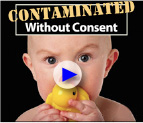Contact: Coming Clean, (802) 251-0203, info@comingcleaninc.org
March 12, 2009
New FDA Appointees Face Chemical Challenge
Scientists, Physicians, Health Advocates pledge support to reform broken regulatory system
Bisphenol A in baby bottles; lead in lipstick; formaldehyde in baby shampoo; pesticide contamination in imported foods — these are just a few examples of the hazards to our health from a disempowered and underfunded FDA. These are just a few of the challenges facing FDA Commissioner nominee Dr. Margaret Hamburg and Deputy Commisioner nominee, Dr. Joshua Sharfstein.
“It's high time for FDA to take aggressive action to ban bisphenol A in baby bottles, infant formula, and other products that infants and young children come in contact with on a daily basis," said Mike Schade of the Center for Health, Environment and Justice.
Dr. Ted Schettler says, “Health Care Without Harm has had a petition before the FDA for over two years, asking the agency to require labeling of medical devices containing diethyl hexyl phthalate (DEHP) so that health care providers will be able to know whether the device that they are choosing or buying contains the chemical. This followed an FDA public health notification in 2002 addressing this issue and recommending the use of alternatives in high risk circumstances. But FDA’s response, after one year, was that they “need more time to decide.” Since then, and a year later, the agency has been silent.”
According to a 2006 poll by Union of Concerned Scientists, industry interference has plagued the scientists at FDA.
Advocates are hopeful that Commissioner Hamburg and Deputy Commissioner Sharfstein will address the dangerous chemicals allowed on the market today that are no doubt linked to the rise in obesity, diabetes, cancer, reproductive and neurodevelopmental health problems.
“We’ve learned the old adage ‘the dose makes the poison’ is simply not true when it comes to some chemicals commonly found in food can linings and cosmetics,” said Mia Davis, of the Workgroup for Safe Markets. “Very small exposures can have an even greater impact than larger exposures because of the way that these chemicals disrupt hormones, especially at critical periods of development. It is time that the FDA works to prevent harm before it occurs, rather than slowly responding, or not responding, after effects show up.”
Available for Interviews
- Mike Schade, The Center for Health, Environment and Justice (CHEJ) 212-964-3680
- Mia Davis, former Co-Coordinator, Workgroup for Safe Markets, 617-777-4792.
- Stacy Malkan, Campaign for Safe Cosmetics, 510-848-5701. Stacy can address the new report, "No More Toxic Tub," about contamiantion of baby products with 1,4 dioxane and formladehye.
- Fred vom Saal, PhD., University of Missouri, 573-882-4367.
- Ted Schettler, MD, MPH, Science Director, Science and Environmental Health Network. Ted is co-author of Generations at Risk: Reproductive Health and the Environment, which examines reproductive and developmental health effects of exposure to a variety of environmental toxicants, and also co-author of In Harm’s Way: Toxic Threats to Child Development. Dr. Schettler can address the petition to notify the public about the presence of the phthalate, DHEP, in medical devices.
- Kathleen A. Curtis, Policy Director, Clean and Healthy New York, a project of
Women's Voices for the Earth, 518-708-3922. - Lindsay Dahl, Healthy Legacy Minnesota, 612-870-3458, http://www.healthylegacy.org
- Dr. David Eisenberg, Anresco Labs, 415-822-1100. David can address FDA failure to prevent pesticide contaminated produce from being sold in the marketplace.
Resources
- Bisphenol A – Breast Cancer Fund Fact Sheet
- Baby’s Toxic Bottle, Center for Health, Environment and Justice
- No More Toxic Tub – Report from Campaign for Safe Cosmetics and Environmental Working Group
- The Endocrine Disruption Exchange
- Is It In Us? A study of chemicals in our bodies
- Contaminated Without Consent
- Union of Concerned Scientists FDA Poll
# # #




